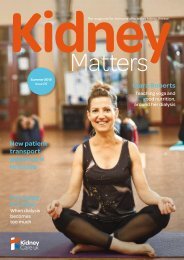Kidney Matters - Issue 9 Summer 2020
Kidney Matters is our free quarterly magazine for everyone affected by kidney disease. This issue includes some advice on keeping busy during lockdown, tips on managing your diet and weight, insight into the life of a carer, and an interview with the fabulous 'Marilyn' (front cover). As well as this the we have some delicious kidney-friendly cherry filo pastry tarts in the Kidney Kitchen and our Kidney Clinic discusses the advantages and disadvantages of prednisolone.
Kidney Matters is our free quarterly magazine for everyone affected by kidney disease.
This issue includes some advice on keeping busy during lockdown, tips on managing your diet and weight, insight into the life of a carer, and an interview with the fabulous 'Marilyn' (front cover). As well as this the we have some delicious kidney-friendly cherry filo pastry tarts in the Kidney Kitchen and our Kidney Clinic discusses the advantages and disadvantages of prednisolone.
Create successful ePaper yourself
Turn your PDF publications into a flip-book with our unique Google optimized e-Paper software.
LEARN MORE
28
AWAK-PD: leading the revolution
in peritoneal dialysis?
An automated wearable artificial kidney
(AWAK) successfully delivers high-dose
peritoneal dialysis (PD) for up to one
month, according to a recent study. This
is the first time that AWAK-PD has been
used in people with kidney failure.
AWAK-PD weighs less than 2 kg and needs only 2 litres
of PD solution a day, so it can be used on the move
during the day, as well as over night. According to the
manufacturers, AWAK-PD provides six to eight hours
of tidal PD and achieves recommended clearance with
a single daily treatment.
AWAK-PD uses sorbent-based technology (a sorbent is a
material that binds another substance to it by a physical
or chemical reaction). The sorbent enables the device to
reconstitute used dialysis fluid into fresh fluid to deliver
high-dose dialysis with a low volume of PD solution.
Dr Martin Wilkie commented: “There is still much
development to be done, and it remains to be seen if
carrying 2 kg around during the day will be acceptable
for patients. However, the potential to reduce solution
volumes is really important in terms of cost and
sustainability, and internationally where solutions are
difficult to obtain.” Martin is Consultant Nephrologist
at Sheffield Teaching Hospitals NHS Foundation Trust,
and has a special interest in PD.
The study was conducted at Singapore General
Hospital, and included 15 people who had been
using conventional PD for an average of 21 months.
The most common side effects were abdominal
discomfort, fibrin in the drain, and bloating. There
were no serious side effects.
The US Food & Drug Administration has designated
AWAK-PD as a breakthrough technology to streamline
approval for marketing in the United States. “Assuming
development remains on track, I would envisage that
AWAK-PD will take several years before if becomes
available in the UK. However, in future this technology
could potentially revolutionise the way PD has been
done,” concludes Martin.
The end of dialysis?
AWAK-PD needs standard dialysis access with a PD
catheter, but other researchers are aiming to abolish the
need for dialysis. A team from the Kidney Project at the
University of California San Francisco (UCSF) recently
reported that they have surgically implanted a ‘kidney
bioreactor’ into pigs. This is an important milestone,
as it is the first time that the kidney bioreactor has
successfully been implanted into animals.
The kidney bioreactor is about the size of a deck of
cards and consists of two parts. A filter processes
incoming blood to create a fluid containing toxins plus
sugars and salts. A bioreactor of human kidney cells
then processes the filtered fluid, sending the sugars
and salts into the blood. Water is reabsorbed back
into the body and is concentrated into ‘urine’, which is
excreted through the bladder.
The kidney bioreactor would not have the same
function as a transplanted kidney—researchers
anticipate an eGFR of 20-30—and EPO will still be
needed. However, people would no longer need
dialysis and, based on the animal study, they would not
have to take medication to prevent rejection.
More research is essential before the kidney
bioreactor can be tested in people with kidney failure.
Researchers are hoping to receive approval for the
first clinical trial in the near future.
Dr Martin Wilkie is Co-chair of International Society for Peritioneal Dialysis /EuroPD
To read more about AWAK technology, go to https://awak.com
For more information about the Kidney Project, visit https://pharm.ucsf.edu/kidney
kidneycareuk.org

















